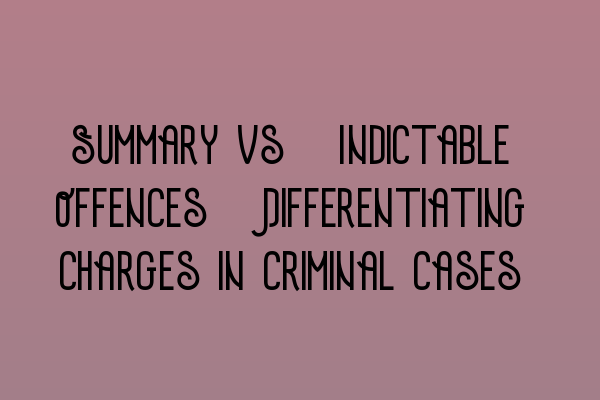Summary vs. Indictable Offences: Differentiating Charges in Criminal Cases
When dealing with criminal cases, it is crucial to understand the different types of charges that can be brought against an individual. Summary offences and indictable offences are two distinct categories, each with their own legal implications and consequences. In this article, we will explore the differences between summary and indictable offences and shed light on their significance in the criminal justice system.
Summary Offences
Summary offences, also known as minor offences, are less serious in nature and typically carry less severe penalties. These offences are considered less complex and are generally dealt with in the Magistrates’ Court. Examples of summary offences include petty theft, public intoxication, and traffic violations.
Summary offences are typically resolved relatively quickly, with the accused person entering a plea and the court proceeding to judgment. The sentencing options for summary offences are limited compared to indictable offences and may include fines, community service, or a short-term imprisonment.
In the context of the Solicitors Qualifying Examination (SQE), aspiring solicitors need to have a comprehensive understanding of summary offences as they are likely to encounter them in their practice. If you are preparing for the SQE, it is essential to familiarize yourself with the essential study materials available for aspiring solicitors. You can find a comprehensive list of these materials in our article on SQE Exam Prep: Essential Study Materials for Aspiring Solicitors.
Indictable Offences
Contrary to summary offences, indictable offences are more serious criminal charges that carry heavier penalties. These crimes are typically tried in the Crown Court, where a judge and jury preside over the case. Examples of indictable offences include murder, robbery, and drug trafficking.
Indictable offences require a more complex and thorough legal process compared to summary offences. The accused individual may choose to plead guilty or not guilty, and if the case proceeds to trial, a jury will determine the verdict. If found guilty, the sentencing options for indictable offences are broader, ranging from fines to long-term imprisonment or even life sentences.
Understanding the structure and format of the Solicitors Qualifying Examination (SQE) is crucial for success. If you are interested in learning more about the examination format and how to prepare effectively, we highly recommend reading our article on Demystifying the Solicitors Qualifying Examination Format.
Conclusion
Summary offences and indictable offences play significant roles in the criminal justice system. Differentiating between the two types allows legal professionals to navigate the complexities of criminal cases and provide appropriate representation to their clients.
Whether you are an aspiring solicitor or an established legal professional, staying informed about key aspects of the legal field is essential. For international lawyers preparing for the SQE, our article on SQE Exam for International Lawyers: Challenges and Success Strategies provides valuable insights and guidance.
Additionally, if you are an entrepreneur looking to establish a limited liability company (LLC), we have detailed step-by-step guides on LLC Formation Made Simple: Step-by-Step Guide for UK Entrepreneurs and LLC Formation: A Step-by-Step Guide for UK Entrepreneurs that can assist you in the process.
